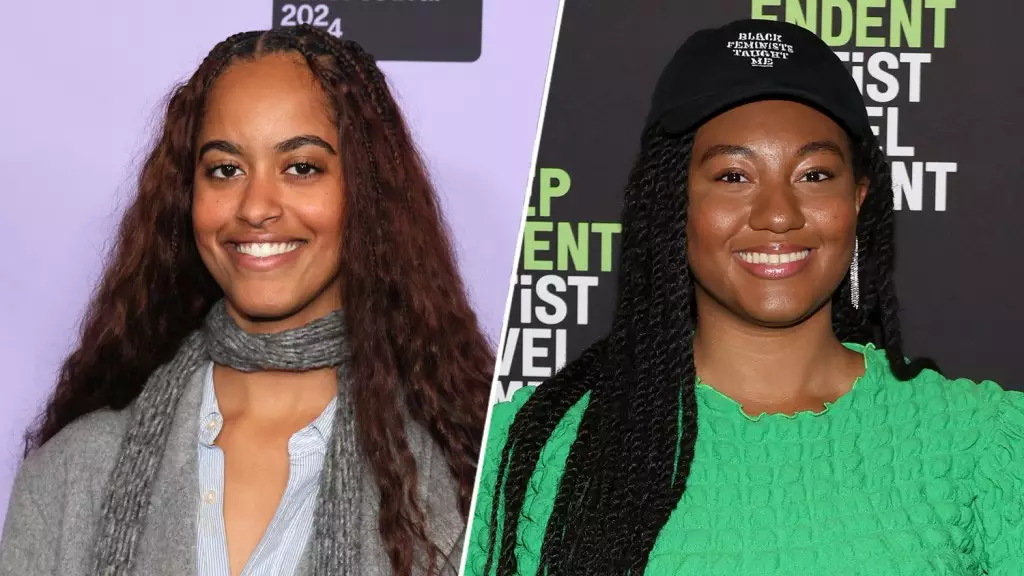Malia Obama’s recent foray into filmmaking, highlighted by her short film “The Heart” at the 2024 Sundance Film Festival, has ignited a heated controversy that echoes the struggles of countless emerging artists. The backlash stems from accusations of creative appropriation made by Natalie Jasmine Harris, the director of “Grace,” a short film that swirled with themes of identity and intimacy. Harris, who attended the same festival with her own project, claimed to see striking parallels between her work and a Nike commercial featuring Malia. It’s a profound tableau: a young woman, steeped in the legacy of her family, standing at the crossroads of originality and inspiration.
In the hallowed halls of an industry that prides itself on innovation, the echoes of nepotism drown out the voices of budding creators like Harris. Her experience brings to light the uncomfortable yet necessary conversation about the nature of artistic ownership. While it may sound trite to claim that “no one invented pat-a-cake,” Harris’s argument transcends this simplistic viewpoint. She insists that the essence of her cinematic language—her camera angles, the treatment of light, and the overall visual narrative—were crucial elements that deserve acknowledgment. This isn’t merely about a game; it’s about the subtleties that make stories profound.
The Weight of Ancestral Expectations
Malia Obama finds herself navigating an unforgiving landscape of high expectations. As the daughter of former President Barack Obama, she not only bears the weight of her family name but also the scrutiny that comes with it. Critics point fingers, eager to judge whether she stands atop a mountain of privilege or has genuinely earned her place in the ever-competitive realm of filmmaking. However, we must ask ourselves: At what point does cultural lineage become a hindrance rather than an asset?
The glorification of Obama as a narrative figure—a celebrated daughter engaged in creative pursuits—shouldn’t come at the expense of voices clamoring for equality and recognition in the industry. Harris’s sentiments reflect a widespread sentiment among grassroots filmmakers who are too often marginalized in favor of those already established. This begs the question: How does one transform privilege into a vehicle for empowerment, not just for oneself but for others striving in the shadows?
Art vs. Commerce: A Costly Trade-Off
Harris’s frustration touches upon a pervasive dilemma within the film industry—how commercial interests often eclipse independent voices. The allure of hiring a recognizable figure like Malia Obama for a high-profile project overshadows the pressing need to foster original storytelling. The unfortunate reality is that this dynamic stifles innovation and becomes a cycle that favors those who already have access, thereby perpetuating a narrow definition of success.
When corporations like Nike opt for well-known personalities for their campaigns, they naively forfeit the wealth of creativity that independent filmmakers bring to the table. The dilemma presented in Harris’s essay is multi-faceted: It speaks to the uphill battle facing upcoming directors who risk everything to challenge conventions in their art. By neglecting new voices, brands perpetuate narratives that may be temporally appealing but ultimately lack depth and originality.
It’s not merely an issue of aesthetics; it’s a flaw in the very fabric that binds the film industry. If big players within the industry continue to disregard fresh perspectives, they will inevitably funnel audiences toward a homogenized experience that sacrifices authenticity for marketability. As filmmakers, the challenge before us is to transcend these barriers and demand a fairer distribution of opportunity and recognition.
The Need for Dialogue in a Divided Space
While it is easy to vilify Malia Obama in this situation, it is more important to shift our focus toward the systemic issues at play. Harris’s disappointment illustrates a wider imbalance that demands attention; it reflects an industry that often overlooks independent artists in favor of familiar faces. The absence of dialogue is stark: Harris has yet to receive any acknowledgment from Obama or Nike, compounding her sense of exclusion.
One can only hope that this controversy serves as a catalyst for change, urging established filmmakers and brands to invest in fledging artists rather than merely co-opting their visions. This moment could potentially encourage the film industry to recognize and embrace its responsibility for inclusivity and authentic representation. Until then, conversations surrounding creative ownership and the ethics of inspiration hold immense significance in reshaping an industry long plagued by inequities. Without such transformations, the future of storytelling risks becoming an unvarying replica of its past—an ironic tribute to a mismatched narrative that champions fame over artistic integrity.


Leave a Reply